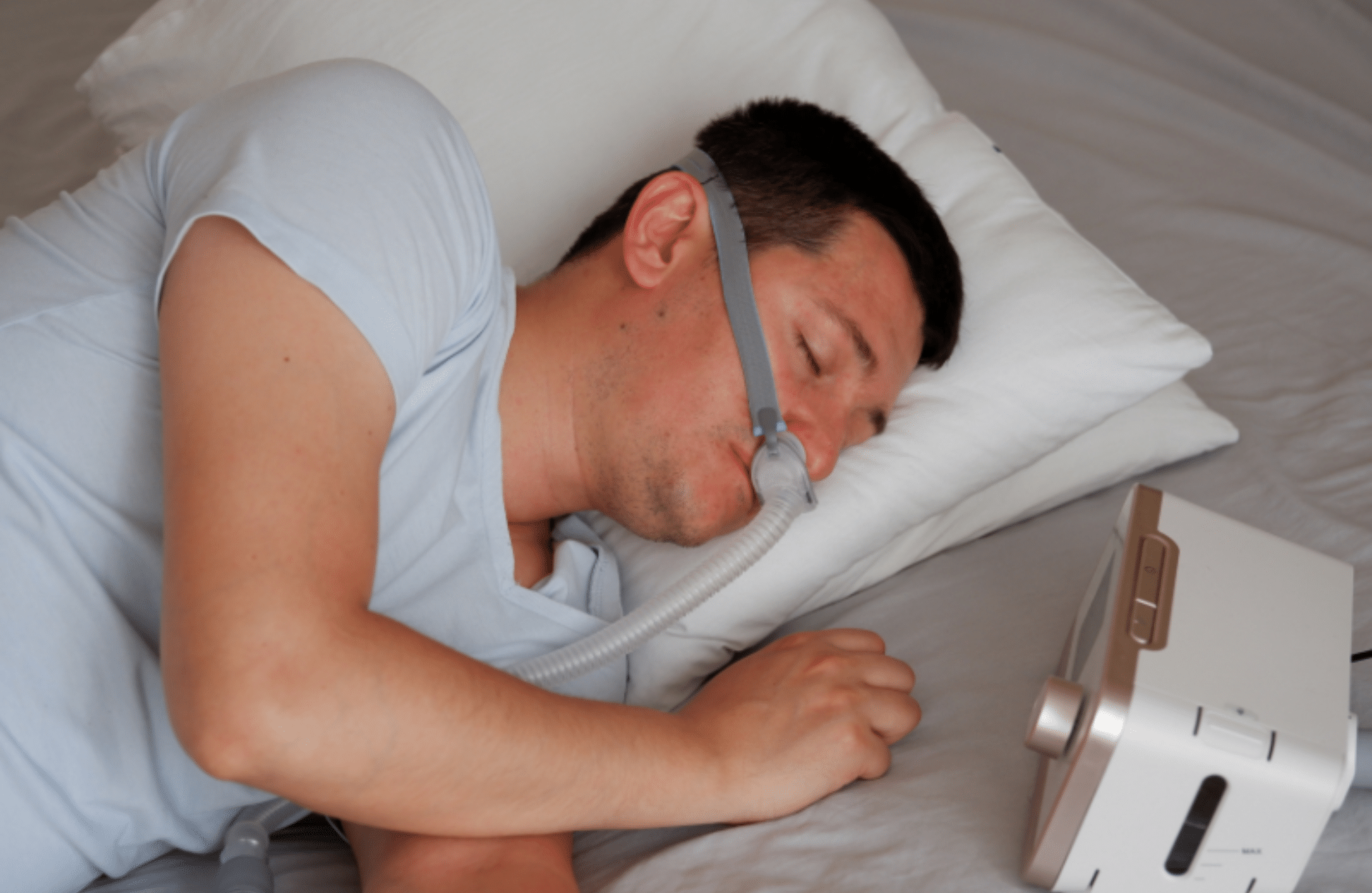Sleep apnea and AFib are worrisome enough on their own, but they can be especially problematic together. The link between heart disease and obstructive sleep apnea (OSA) is well-known, but how does AFib figure into that equation?
Before we get to the heart of the matter though, let’s first talk about each disorder and why it’s so important to treat them.
What is AFib?
Atrial fibrillation (AFib) is the most common type of arrhythmia, or irregular heartbeat. AFib causes your heart to beat rapidly and chaotically, out of sync with its normal rhythm. AFib can cause heart palpitations and shortness of breath, and can increase your risk of heart disease and stroke.
AFib itself isn’t typically life-threatening, but it can be a sign of greater issues.
Many people with AFib may not experience symptoms at all, while others will. Some of these symptoms include:
- Palpitations: Feeling irregular or rapid heartbeats, like fluttering or pounding in the chest.
- Chest pain: Experiencing discomfort, pressure, or pain in the chest area.
- Shortness of breath: Feeling breathless or unable to catch your breath even during light activities.
- Dizziness or lightheadedness: Feeling faint or woozy, especially when standing up.
- Fatigue: Experiencing unexplained tiredness or weakness.
AFib is frequently caused by various underlying heart issues, including:
- Heart attack: A previous heart attack can lead to scarring or damage to the heart muscle, disrupting the electrical signals that regulate the heart’s rhythm.
- Congenital heart defects: Some individuals are born with structural abnormalities in their hearts that can predispose them to develop AFib later in life.
- High blood pressure: Persistent high blood pressure can strain the heart, leading to changes in the heart’s structure and function, increasing the risk of AFib.
- Coronary Artery Disease: When the arteries supplying blood to the heart become narrowed or blocked due to a buildup of plaque, it can lead to oxygen deprivation and subsequent irregular heartbeats.
- Heart valve problems: Conditions such as valve stenosis or regurgitation can affect the heart’s ability to pump blood efficiently, leading to the development of AFib.
Interestingly enough, like many health disorders, AFib can be caused by sleep apnea too.
The Connection Between Sleep Apnea and AFib
Sleep apnea is a serious sleep disorder characterized by irregular breathing patterns while you’re asleep. Irregular breathing during the night deprives your body of oxygen and stresses your cardiovascular system. The vast majority of people who suffer from sleep apnea have obstructive sleep apnea. Although some people will hold their breath at night, most will struggle to breathe through a partial blockage of the airway. The sound of snoring is actually the sound of a blocked airway, and a telltale sign of obstructive sleep apnea.
Sleep apnea increases your risk of heart trouble, including heart attacks, high blood pressure, and AFib. To make matters worse, heart disease and sleep apnea can have a cyclical effect on each other, making each other worse as your symptoms persist.
One meta-analysis found that while more research is needed on the topic, the incidence of atrial fibrillation is 88 percent higher in sleep apnea patients, compared to those without the disorder. However, the percentage of AFib patients with sleep apnea is currently unknown because of how underdiagnosed OSA is. [1]
For context, 1 in every 15 Americans have sleep apnea, but 1 in every 50 people are undiagnosed. To make matters worse, sleep apnea increases your risk of heart trouble because it causes your heart rate and blood pressure to elevate. It also forces your heart to work harder to pump blood throughout your body.
Another study has found that the physiological changes caused by sleep apnea— such as greater pressure in your chest and decreased oxygen levels— may cause changes that may make you more vulnerable to arrhythmias like AFib. Obstructive sleep apnea alone may also increase your risk of AFib, and it can worsen your symptoms if you already have it. Both disorders can also make you more vulnerable to strokes. [2]
So with all this in mind, what can be done to treat atrial fibrillation if you have sleep apnea too?
Related: Can Sleep Apnea Cause a Heart Attack? The Link Between Sleep Apnea and Heart Disease
How to Treat AFib if You Have Sleep Apnea
One major takeaway from the above research is if you have both disorders, one of the best ways to treat AFib is to treat sleep apnea. CPAP therapy stands as an unparalleled solution for addressing obstructive sleep apnea. In comparison to alternative treatments such as oral devices and the Inspire device, CPAP therapy boasts an established body of research demonstrating its unique efficacy in treating sleep apnea.
Short for continuous positive airway pressure, CPAP therapy prevents the collapse and obstruction that causes your sleep apnea symptoms. CPAP uses a constant, gentle stream of pressurized air to hold your airways open while you sleep so you can breathe normally.
Not only does this help you sleep better, but it takes significant strain off your heart. If you have heart disease, CPAP therapy can also reduce the risk of hospitalization or cardiovascular death. It can also help reduce high blood pressure, reduce lipid levels in your blood, and help your heart function more efficiently.
Adopting a healthy lifestyle can help reduce both OSA and AFib symptoms as well. Here are a few easy ways to get started:
- Follow a consistent bedtime and wake-up time every single day
- Eat a balanced diet high in fresh fruits, veggies, whole grains, and healthy fats
- Avoid alcohol and caffeine before bedtime
- Regular, moderate exercise— even just a little can reduce the severity of your OSA symptoms!
Don’t Let Sleep Apnea and AFib Break Your Heart
Obstructive sleep apnea and atrial fibrillation are worrisome enough separately, but together they can cause your body a lot of harm— especially if you don’t know you have them.
It is vital to get tested if you’re struggling to get a good night’s sleep, especially if you already have heart disease. An overnight sleep study can detect any abnormalities in your sleep, allowing a sleep specialist to make a formal diagnosis. And with a diagnosis, you can begin the treatment you need to get the sleep you deserve.
If you think you may have obstructive sleep apnea, sleep-disordered breathing, or are at risk for them, contact your doctor or a sleep specialist for an evaluation. The idea of getting a good night’s sleep shouldn’t strike fear into your heart. Contact the Sleep Centers of Middle Tennessee today to get back to the healthy sleep you need each night.
References
- Moula, Amalia Ioanna, et al. “Obstructive Sleep Apnea and Atrial Fibrillation.” U.S. National Library of Medicine, Journal of Clinical Medicine, 25 Feb. 2022, pubmed.ncbi.nlm.nih.gov/35268335/.
- Marulanda-Londoño, Erika, and Seemant Chaturvedi. “The Interplay between Obstructive Sleep Apnea and Atrial Fibrillation.” U.S. National Library of Medicine, Frontiers in Neurology, 11 Dec. 2017, www.ncbi.nlm.nih.gov/pmc/articles/PMC5732262/.



